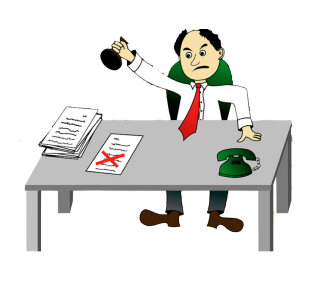 Lawyers (those worth their price) relish when they get to remind enforcement officials that they are as obligated to follow the law as they are to enforce it. The government is constrained by due process considerations from manufacturing laws out of thin air. We are watchdogs against tyranny. Take, for example, appealing a failing grade on the customs broker exam. You might wonder how government overreaching can infect this seemingly esoteric area of the law, but a law is no longer esoteric when it affects you personally. Imagine if you invest considerable time and money to studying the customs broker exam, but you come up short, missing passing by a couple of points. Voilà! There is an appeals process afforded you in Title 19 of the Code of Federal Regulations. In fact, appeals are set out neatly in 19 CFR Sections 111.13 and 111.17. It’s all there. Just follow the regulations as officially set out by the agency, and you’ll get a fair and square review of your appeal. If only it were that simple. US Customs and Border Protection’s website has additional, and some (like me) would say different and arbitrary requirements. Suddenly appellants face an additional layer of bureaucracy not found in the regulations. CBP did not publish these new requirements in the Federal Register to allow the public to comment. Here is the most alarming part. CBP automatically rejects an appeal for any of the following: An incomplete application.
How shall I begin? CBP reserves to itself the power to automatically reject your appeal for an infraction of any of the arbitrary requirements. Automatically? CBP fabricates arbitrary, vague rules, and people don’t even get to first base if they don’t follow those rules? CBP will automatically reject your appeal if it’s incomplete, which begs the question, what does a complete appeal look like? By “incomplete erasures or insufficient markings”, I assume that CBP is referring to the ovals on the standardized answer paper sheet that test-takers must fill in with a No. 2 pencil. Ghosts of the hanging chads! CBP can’t be really asserting that people can’t confirm that CBP accurately recorded their test results. Here is the real kicker: “if the application includes any arguments written by another person.” This requirement is an audacious arrogation. CBP is saying that the person filing the appeal must not have anyone assist in preparing the appeal. The appeal has to be in your own words. There is nothing in the regulations or under statute that forbids a person from having someone help you with your appeal. There could not be. The customs broker exam is over. The person appealing is not obligated to prove additional mastery of customs brokerage, and especially not by drafting clever expositions to try to impress CBP. The customs broker exam is standardized to remove all subjectivity from the process. If one person gets credit for his or her answer, all other test-takers who answered the same automatically deserve equal consideration regardless of who wrote the appeal, and regardless of whether everyone uses identical arguments to appeal. I venture to guess that CBP conjured up this requirement to discourage people from collaborating on their appeals. A group of smart people might punch holes in CBP’s carefully-crafted exam. CBP may even want to discourage people from hiring lawyers to help with their appeal. As I said earlier, lawyers tend to force honesty upon government officials. If these unworthy motives are driving CBP, then the agency would do well to reconsider. CBP should want would-be customs brokers to work with others to follow the laws as written, even when this kind of rare integrity inflicts a little discomfort upon a bureaucrat or two.
0 Comments
|
Oscar Gonzalez
Principal and a founding member of GRVR Attorneys. Archives
September 2016
Categories
All
|
- Home
- Who we are
-
Our Practice
- Customs and Import
- 301refunds
- Export
- Litigation
- Section 232 and 301 Tariffs
- Outsource Your Classification
- CBP Audits
- Fines, Penalties, Forfeitures, and Seizures
- Customs Brokers
- C-TPAT >
- Foreign-Trade Zones
- Antidumping and Countervailing Duties
- Intellectual Property RIghts
- Foreign Corrupt Practices Act
- Manifest Confidentiality
- Contracts and Incoterms
- False Claims Act and Whistleblower
- Blog
- Resources
- Calendar and Events
- Best Customs Broker Exam Course
- Contact
 RSS Feed
RSS Feed
